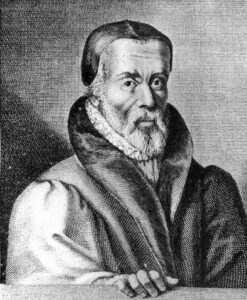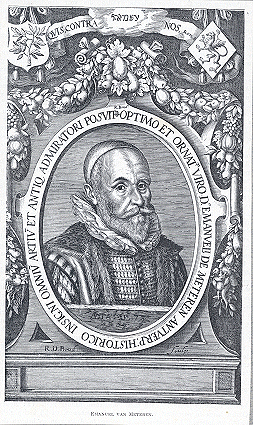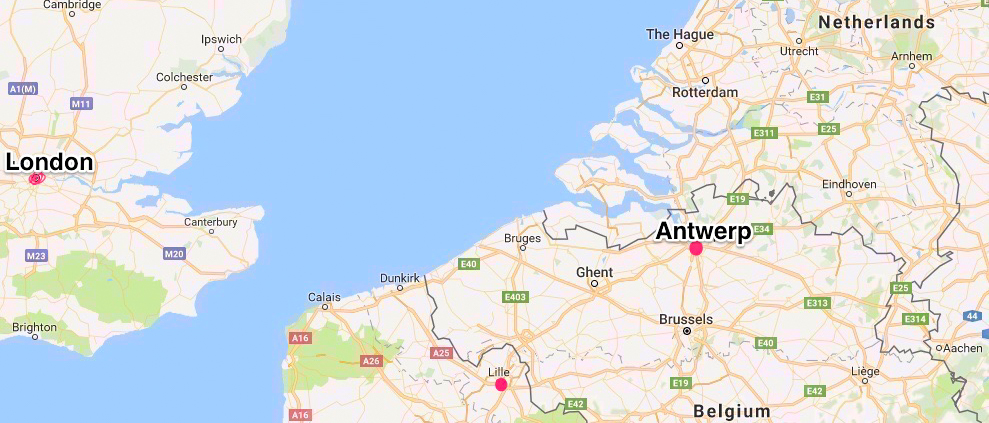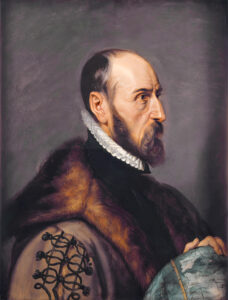Jacobus van Meteren Family
Another van Meteren line is through Sir Jacobus van Meteren of Breda, Netherlands, son of Cornelius. Jacob financed and assisted in the early bible translations to English and the printing of other “banned” books. His wife was the aunt of the famous geographer, Abraham Orelius, who became a close associate of his cousin Emanuel. Emanuel was well educated, was an author who documented events of his time, and influenced some of those events. He became Dutch Consulate in London, and was a friend of Henry Hudson and had access to his journals. I’ve included their interesting stories below.
You can find a Family Tree for this family on my post Parents of Jan Joosten Van Meteren.
Table of Contents
Jacobus van Meteren and Otillia Ortelius
Jacobus van Meteren was the financier and printer of earlly English versions of the Bible and other ‘banned’ books. He married Otilia Ortelius, daughter of William Ortelius, of Ausburch (Augsburg, Hungary. Otillia was the aunt of the world-famous geographer, Abraham Ortelius. Abraham was the son of Otillia’s brother Leonard.
Jacobus and Otillia, like Abraham Ortelius’s father, Leonard, had accepted the new forbidden doctrine of the Reformation, and suffered for it.
When Jacobus was in England in 1535, for the publication of the English-language Bible, his wife was pregnant with her son in Antwerp. The authorities sent men to search her house in order to arrest Leonard Ortels (who used to stay there, for religious reasons), and at the same time to see whether any forbidden books were to be found. The cruelty of this searching party caused the good woman to entreat the Lord that they might fail to find the paper; and it so happened, although they several times laid hands on the box which contained the books, they failed to get them. Recognizing in this God’s merciful aid and protection, she made a vow, if she gave birth to a son, to call him Emanuel, i.e., “God with us.” This vow she fulfilled. Hence Emanuel, when he grew up to be a man, took cause generally to add to his name. “Quis contra nost” i.e., “If God be with us, who is against us?” in order better to remember the Lord’s mercy previously shown, and to trust him in all danger.1

William Tyndale, Protestant reformer and Bible translator 2
Emanuel van Meteren
Emanuel van Meteren, was born September 6, 1535 in Antwerp. He first married in 1562 at the age of 26 to a Miss Van Loobroek, 22 years old, who died on December 13, 1563 from the bubonic plague. He second married in 1564 Esther van den Corput, daughter of Nicolaus van den Corput, Secretary of Breda. They had 13 children: 3 boys, 6 girls and 4 unknown.
Emanuel was a historian and chronicler of events of his time and also a powerful and wealthy man who influenced those events. He became the Dutch Consul in London and authored several books later in life.
Translated from [the old Dutch book] Life and Death of the Venerable, Pious, and Renowned Emanuel Van Meteren, briefly described by his loyal friend, Simeon Ruytinck, the minister of The Dutch church in London from 1601-1621 [date written unknown, but was most likely shortly after Emanuel’s death in 1612, and before Ruytincks death in 1621]:

Emanuel van Meteren3
Emanuel’s parents sent him to school early in youth to be instructed in languages and all good learning, taking these to be the most useful and safest possessions. His first school was at Antwerpen, his second at Doornick, the third at Deiffeln, where, to the joy of his parents, he made great progress in Latin. They summoned him home to see this gratifying improvement in 1549. His father, having gone to England on business, called his son thither in 1550, and made him understand that since he was now fifteen years old, it was befitting that he should consider what he would like best to engage in, commerce or study. He answered his father that he was inclined to be apprenticed to a merchant to learn commerce, and in this way, make a living in the course of time.
Thus, he was turned over for a period of ten years to the business house of Sebatian Daukkearts, of Antwerp, who, in 1552 (the year of King Edward’s death), moved from London to Antwerpen. [a year later, in 1553 his parents would die at sea.] Emanuel, having lost his parents, settled down faithfully to his tedious service. His patience was rewarded. During his time of service, he went on two voyages, viz., in 1556 and 1558, to England, and saw there the great cruelty which, under the reign of Mary, was used against the reform church. When he was in London his master died in Antwerp; then he gave the remaining years of his bond-service to his master’s widow, after which he settled in London, received commissions of many excellent merchants, and behaved with great prudence.
He married in 1562, at age twenty-six to a miss Van Loobroeck, age, twenty-two. This lady had been a prisoner in Antwerpen because she had attended the sermon at Hoboken. She was miraculously
rescued through a hole bored in the wall. She died in London December 13, 1563 (from pestilence, along with about twenty-three thousand seven hundred and sixty persons).
Several months later, he had gone to Antwerpen on business, he was introduced to the society of Miss Esther van den Corput, daughter of Nicolaus van den Corput, secretary of Breda, son of Johann ( John) van den Corput, formerly mayor of the same place. After a certain time, with the consent and congratulations of the parents, the marriage came to pass. He returned to London together with his wife in 1564. Emanuel and Esther had thirteen children. At the time of this writing [could not find date, but was after his death in 1612 and before Simeon Ruytincks death in 1621], three sons and six daughters were still living, as was his wife Esther.
One of the main difficulties which befell him during his married life was his imprisonment at Antwerpen, where he had gone on business in 1565. He describes it at length, while we only briefly mention it. On the 2nd of May, at noon, coming from the Exchange, he writes:
“… and going to my cousin’s (Abraham Ortel’s), where I was lodging, I was arrested by a Spaniard, Julian de la Sierna by name, lieutenant in the service of Comergo, the Provost. He came in company with six or eight helbardiers [a man armed with a halberd (spear or battle-ax)], and arrested in the name of the Governor-General of the country. They took hold of me as though I were a disorderly person (disturber of the peace), binding together my arms. No questioning or parleying availed, but I was taken to the Backers gate prison between two helbardiers, the Spaniard preceding us.
I was much dismayed. They took from me my letters and keys, and asked if my home was not at Mr. Andreas’ in Gallicia. I told them that they had the wrong man before them. Nevertheless, they went straightway to my house and took all of my writings, books, and letters. I was much afraid, expecting the worst, viz: that they would torture me and put me to death. At night, they locked us up in a small house, in which there were but three little holes as big as a fist that we got light through. On the next day, an old woman came to us doing charity to the prisoners, and, seeing me, asked if I were Emanuel. I said yes, and found out then how she came to know me. She told me to have good courage, since many good friends, such as the Hoefuagets, Hufman, etc., were exerting themselves in my behalf (soliciting favor for me). This gave me some courage, and I took so much the more earnestly to praying.
Two or three days I sat in perplexity, hearing and seeing nothing, only praying to God, and after considering how I could best make my defense, I was unable to make up my mind whether to defend myself as a citizen of Antwerpen or as an Englishman. While these thoughts were troubling me, the daughter of the assistant jailer came to my door stealthily and called through the key- hole: “Englishman! ⁄ Englishman!” I asked what she wanted. She said I was to defend myself as an Englishman; that I was to be tried that day by Councilor Boone, but it would be all right, etc. This was good doings and gave me courage. I thanked God for this assistance.
On the 7th of May in the afternoon Councilor Boone came, took me separately to the chamber where oaths were administered, had me sit down, had all my papers before him, charged me on my oath that I was to tell the truth in answering all questions. I remarked at length, highly commending at the same time his honesty and uprightness. But he asked me to follow his advice and I should do well. Thus, perceiving that he favored me and had consulted with my friends, I yielded to him. He began taking down name, date of birth, and names of my friends; asked me if I knew certain people in London and Antwerp. Peter Luis, John Rademaker, John Niket, and others; also, what I was doing with Eobanns Hess’ psalms in Latin verse, and with a German pamphlet on the Dutch treaty of peace, and whether I did not know something concerning the last (recent) treason of Antwerp.
He also asked what contributions were made by the Secret Council and the City of London to the Prince of Orange; whether I had persuaded any one from giving the King the assessed; what letters Daniel Rogers, Secretary of the English Ambassador, had handed me, etc. To all of this I gave brief and cautious answer, referring him to Messrs. John Boyschot and Van Swevigem, who knew well how I had been employed in England in matters pertaining to international(?) communications and in making out general decrees. All this he put down, and made me sign the statement.
In the meantime, the news of my imprisonment reached London, to the great afflictions of my wife and friends. Martin de la Faille received letters in my favor from Mr. Boyschot, Ambassador in England. John Rademaker obtained letters from Secretary Wasinghan to the English Court- Maser(?) at Antwerp that I was to be treated as English. My good friend in Antwerp, in my name, submitted a petition to the Grand Commander; so that at last (after I had often thought of preparing for death), unexpectedly, Councilor Boone came again to see me, exactly when I had finished reading “De Immortalitate Anime,” by Lewis Vivis, which Al. Ortels had found a way of sending to me. The Councilor said that he had requested His Excellency to dismiss me, although he had great cause to proceed against me with rigor. He advised me to leave by the first ship, without, however, having any order to require me to do so or exile me. Hereupon I got ready my belongings in the prison and left on May 20, 1575, which day will ever be sacred to me. I thanked the Lord with all my heart, took leave of my good friend, who rejoiced with me, and reached London on May 30th, to the joy of my family and friends.”

In 1581, he harbored Christiaen, the fourth secretary of William the Silent, Prince of Orange, while he was being pursued by enraged Spaniards. To help thwart the plots of the Spanish Ambassador at the Court of Queen Elizabeth, William the Silent enlisted one Willem Janszoon van Hoorn, the captain of the Sea Beggar, to pretend to accept a bribe from the Spanish Ambassador and enter into a conspiracy to surprise the English garrison at Flushing. To avoid trickery Don Bernardino de Mendoza had insisted on having the captain’s small son as a hostage.
Since trickery was indeed intended, the captain was desperate as to what might befall his son. The Prince of Orange promised him on his word of honor that he would have the boy kidnapped from the Spanish Embassy in London and safely conveyed home. Christiaen (later called “The Elder”) was commissioned to redeem at all costs the Stadholder’s given pledge.
Van Meteren made some arrangements with the Secretary of State, Sir Francis Walsingham, who was in charge of security for the embassy. Nevertheless, Christiaen and the boy narrowly escaped the pursuit of the enraged Spaniards who scoured the banks of the Thames for him and the boy. Emanuel was successful in concealing them and effecting their escape.
Abraham Ortelius
Abraham Ortelius was born April 14, 1527. He became a Flemish cartographer and geographer, recognized as the creator of the first modern atlas.
In 1575, he was appointed geographer to the King of Spain, Philip II, on the recommendation of Arias Montarius, who vouched for his orthodoxy. He traveled extensively in Europe, and is specifically known to have traveled throughout the Seventeen Provinces; in southern, western northern and eastern Germany, France, England, Ireland and Italy.
Beginning as a map-engraver, in 1547 he entered the Antwerp Guild of Saint Luke as an illuminator of maps. He supplemented his income trading in books, prints, and maps, and his journeys included yearly visits to the Frankfurt book and print fair where he met Gerardus Mercator (renowned for creating the 1569 world map and famous geographer) in 1554. In 1560, when traveling with Mercator, he seems to have been attracted, largely by Mercator’s influence, towards the career of scientific geographer.
Abraham died in Antwerp June 2, 1598 at the age of 71.

Abraham Ortelius4
Citations & Attributes
- Genealogies & Sketches of Prominent Old Families, by Benjamin Van meter, p 159, ancestry.com online at ancestry.com imageviewer collections
- William Tyndale, Protestant reformer and Bible translator, By Foxe's Book of Martyrs, Public Domain, https://commons.wikimedia.org/w/index.php?curid=12761351
- Emanuel van Meteren-By Engraver: R. Boud - Transferred from nl.wikipedia to Commons., Public Domain, https://commons.wikimedia.org/w/index.php?curid=4961909
- Abraham Ortelius - By Peter Paul Rubens - Museum Plantin-Moretus, Prentenkabinet, Public Domain, https://commons.wikimedia.org/w/index.php?curid=12621085
